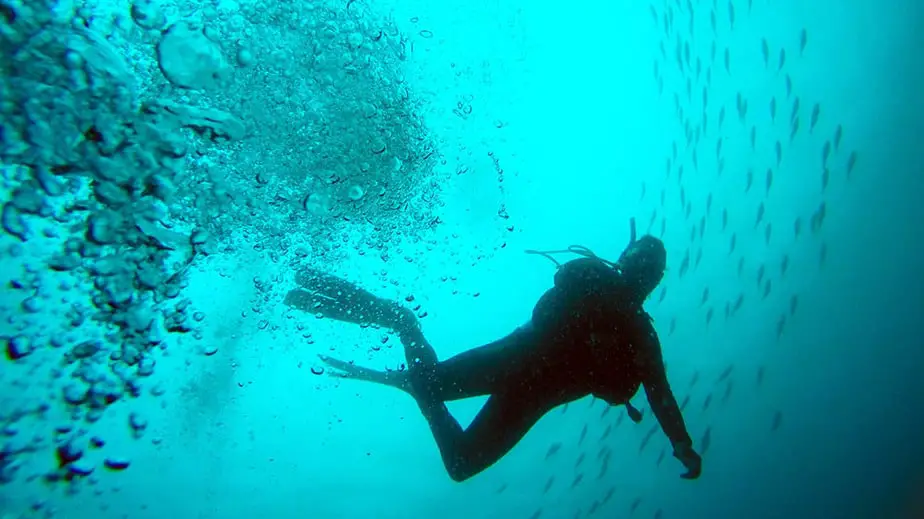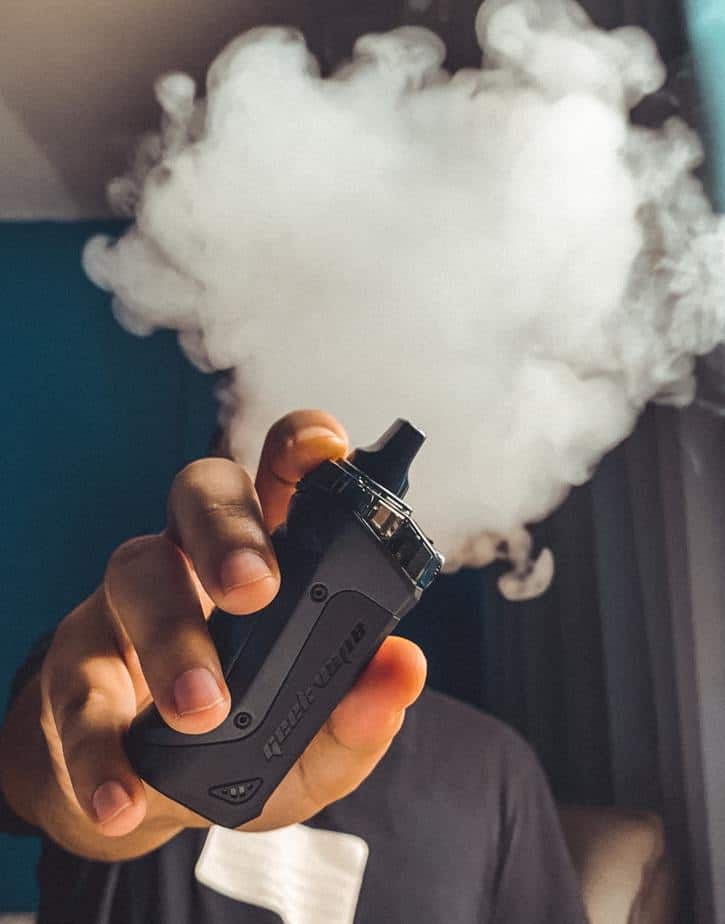At this point, it’s not a secret that smoking is bad for one’s health. Yet people do it anyways, and arguing whether one should or shouldn’t smoke is not the point of this article. What is relevant is that smoking harms your lungs which in turn affects your ability to breath, and that is very relevant to the topic at hand. Smoking also has additional negative effects which could limit your ability to scuba dive.
Can you scuba dive if you smoke or vape? Yes, you technically still can. In fact, I know a few divers who smoke and dive. That said, smoking will decrease your lung capacity which can make you struggle to breathe. It can also make you susceptible to serious risks such as gas embolisms, vascular diseases, cancer, heart attack, and decompression sickness. Also, you’ll piss off your dive buddy if you need to surface long before he needs to, forcing him to end his dive prematurely as well. Depending on your condition, perhaps it’s best if you don’t scuba dive.
Smoking is a clear risk-factor in diving, and you are doing yourself no favors by smoking and diving. In this article, we will discuss some of the major ways smoking will negatively impact diving, and why you should get a medical check-up with your doctor and get the all-clear first.
Health risks for smokers
Decompression sickness

One of the most important processes for diving is gas exchange. When divers breathe compressed air under pressure at depth, they absorb nitrogen into their blood and tissues. When a diver ascends, the excess nitrogen is released, and this is known as off-gassing. However, when the nitrogen is released too quickly, the nitrogen can form bubbles in the body and this causes decompression sickness, which can be fatal.
Where does smoking fit into all this? Smoking can cause vasoconstriction, which is when the blood vessels narrow. This is the body’s defense mechanism so that as little of the toxic substance can be inhaled. Unfortunately, this makes it harder for you to breathe and reduces the efficiency in which nitrogen can be off-gassed.
Another factor is in how smoking affects hemoglobin, the red blood cells that transport gasses around the body. A smoker’s hemoglobin is more likely to bond with carbon dioxide than oxygen, which can cause shortness of breath. More red blood cells are required to do the same functions compared to a non-smoker, meaning further blood flow restrictions and lower off-gassing rates.
Air or gas trapping
Additionally, the nicotine found in cigarettes causes the body to increase mucus production and simultaneously paralyzes the cilia of the mucous membrane, which is supposed to remove the nicotine. As if things weren’t bad enough, the mucus produced will be extremely viscous, further impeding the natural cleaning process of the lungs and the exchange of gasses.
Another problem arises when the mucus fails to adhere and allows breathing gas to flow into the alveoli (where the lungs and blood exchange carbon dioxide and oxygen during the breathing process) and gets trapped. If the air is trapped inside the lungs, it’s no different than a diver holding their breath, meaning a ruptured lung becomes a major risk.
In some countries, anyone with a history of asthma, even those who last dealt with asthma decades prior as children are not permitted to dive. Yet some of these countries have no qualms with smokers diving despite evidence showing that long term heavy smokers can have such constricted airways that they are probably at greater risk of lung barotrauma than asthmatics who have never smoked.
Increased risk of cancer
How can we talk about smoking without bringing up the topic of cancer? It’s true, smokers are more likely to get lung cancer than non-smokers.
Not just that, but smoking is also considered a major trigger for other types of cancers, including cancer of the mouth, tongue, trachea, and larynx. Bladder, kidney, esophageal, colon, and pancreatic cancers are also linked to nicotine consumption. Additionally, smoking can cause women to be at risk of cervical and breast cancer.
Other risks
Those who smoke tend to look older than they actually are. Nicotine consumption can cause wrinkled skin due to a reduced supply of oxygen to the skin and tissues as a result of the permanent vascular constriction in the vessels that provide blood and oxygen.
Another major concern is in the heart. Smoking causes high blood pressure, and diving does as well even in healthy individuals. Thus, the combination of smoking and diving can lead to an increased risk of heart attack.
Next, smokers are more prone to experiencing panic attacks than non-smokers. We aren’t sure why, but the current hypothesis is that there is a link between lung disease and panic attacks.
Furthermore, smokers are also more likely to be affected by acid reflux. This is because nicotine can relax the lower esophageal sphincter (the valve between the stomach and the esophagus), allowing stomach contents to back up. This increases the likelihood of vomiting, and even in the case of an empty stomach, the stomach acid can cause heartburn.
Ultimately, there are numerous concerns related to smoking and scuba diving, some of which are minor, but some of which are also incredibly serious. That’s why it’s crucial that you consult with a diving physician and get the all-clear if you are a smoker and want to dive. You should also get regular check-ups to ensure your health isn’t deteriorating too much.
Vaping and diving concerns

Compared to smoking’s long history, vaping is a relatively new trend. Due to the lack of extensive research and data on vaping, it’s still not fully clear what the long-term effects of vaping are. Even though vaping has been around since 2004, it didn’t receive a surge in popularity until years later.
That said, there are a few things we do know about vaping. Vaping is marketed as being a safer alternative to smoking, and that’s technically true, but it’s still not a good idea to vape. Cigarettes contain approximately 7,000 chemicals, many of which are toxic, and e-cigarettes contain fewer toxic chemicals.
However, vaping can still cause lung injury and death. Cases where somebody died due to vaping are predominantly due to people who have modified their vaping devices or used black market e-liquids containing THC.
Like smoking, vaping is known to cause airway resistance and inflammation of the lower and upper respiratory tract. In some cases, it has also been found to cause arterial stiffening.
Currently, Divers Alert Network’s (DAN) stance on vaping is that they have some clear negative side effects mostly affecting the cardiovascular system, however it’s still unclear what the long-term effects of vaping are on scuba diving. They ultimately recommend quitting smoking and vaping to reduce any risks.
Quitting smoking
The good news is, even if you currently smoke or vape and don’t want it to impact your scuba diving experience anymore, it’s possible to regain full control of your bodily function assuming you have not yet developed any chronic diseases from smoking.
If you plan on quitting smoking, the biggest hurdles are dealing with withdrawal and the urge to smoke or vape again. During the withdrawal stage, it’s likely that one can experience symptoms such as bloating or emotional distress.
Weight gain is another issue with quitting smoking. Smokers burn more calories than non-smokers, and a sudden cessation of smoking without any change to one’s diet or exercise regimen means that weight gain will occur. Additionally, it’s possible that someone trying to curb their nicotine cravings may replace it with excess food and drink, which can also result in weight gain.
For this reason, exercise is a great solution. It can help with preventing weight gain, as well as help deal with the physical and emotional distress of quitting. In fact, scuba diving can be a good way to provide proper exercise and help calm the nerves.
Those who are experiencing high levels of discomfort should consult their doctor who can prescribe medication for relief. Overcoming the withdrawal stage of smoking is extremely difficult for many, but it’s really important if you are serious about safely scuba diving and doing more extreme dives in the future.
Parting words
Even though smoking or vaping is not conducive to a good scuba diving experience, the reality is that many smokers do scuba dive. If you are smoke or vape and have not yet gotten a check-up with a diving physician, you should consider doing so and getting the all-clear before you continue diving.
Smoking contributes to a lot of risks including lung and heart diseases, various cancers, difficulty breathing, and decompression sickness. While there is insufficient research on the effects of vaping on scuba diving, the preliminary research suggests that while vaping is not as bad as smoking, it can result in similar increased risks.
Smoking and diving is not against any rules; no one can stop you if that’s what you want to do. However, diver’s should evaluate their own personal lives and their tolerance for risk when considering if they want to smoke or vape and scuba dive.

